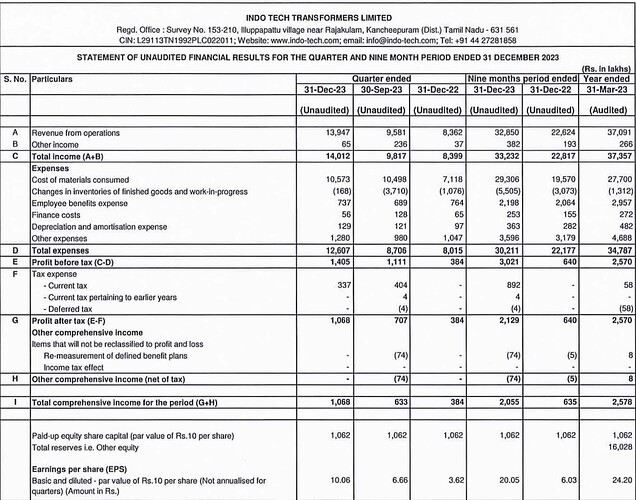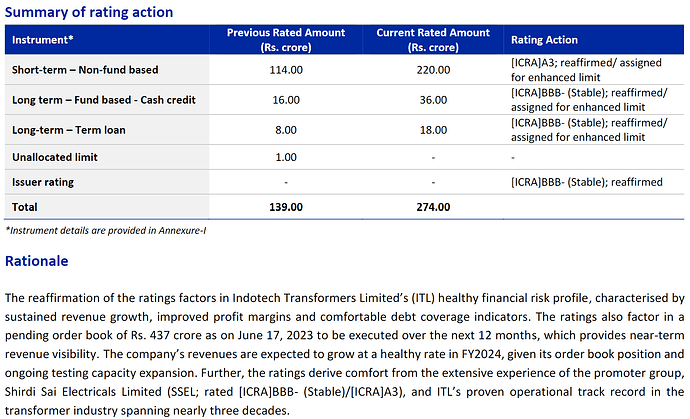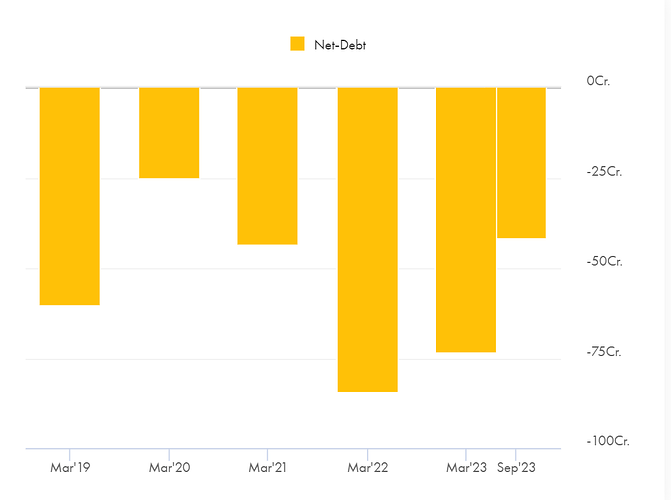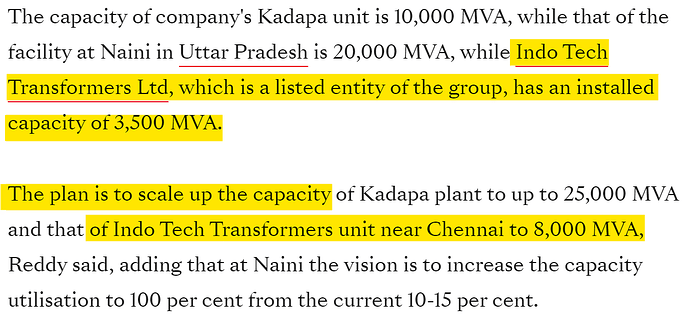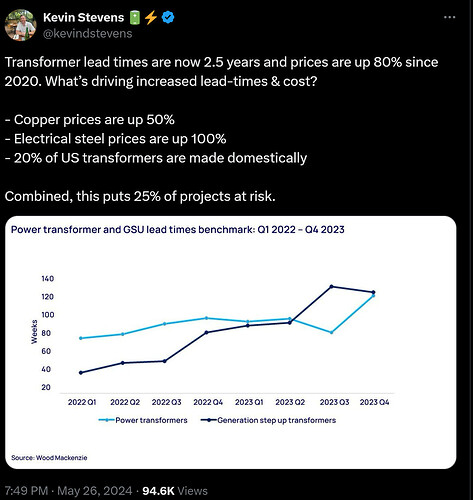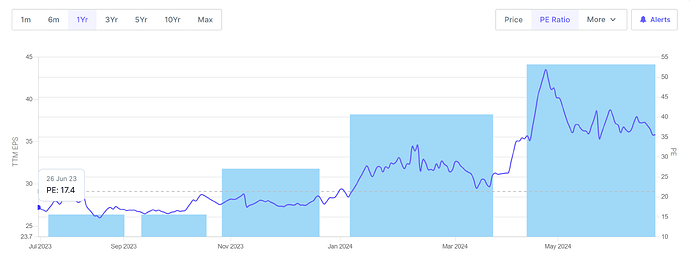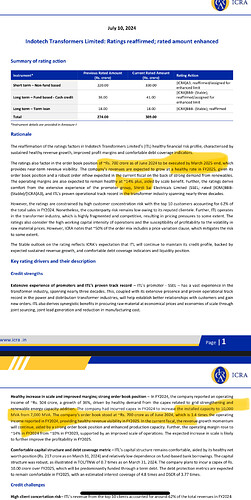About the company -
Indo Tech Transformers Ltd was, established in 1976 is one of the leading transformer manufacturing Companies situated in Southern India having manufacturing facilities at Kancheepuram in Tamil Nadu. Over 56000 Transformers of different ratings up to 245 KV are in service in various Substations and Industries across India and around the world.
The Company’s facilities are established keeping in mind the best available infrastructure and with state of the art equipment’s for manufacturing and testing. The Extra High Voltage (EHV) transformers facility is totally dust free to enable manufacture transformers under very sterile conditions. The testing lab accredited by NABL equipped to carry out all routine and special tests as required by various national and international standards.
Indo Tech Transformers Limited is engaged in the business of manufacturing Power, Distribution, Invertor, Convertor special application transformers, catering to various industries like Transmission, Generation, Hydro, Wind, Solar, Steel, Cement, Textiles, Utilities, DESCOMS etc.
Among our clients are some of the renowned companies like TNEB, NTPC, ADANI, L & T, ABB, SIEMENS NLC, VESTAS, DVC, GAMESA, BGR, SUZLON, TATA PROJECTS, KEC INTERNATIONAL, REGEN POWER TECH, RELIANCE, WALCHAND, TKIS, DOOSAN, GE etc. and leading Hotels, Hospitals, Steel and Cement Plants etc. Our transformers are in service at many Ferrous and Non-Ferrous metal industries throughout the country. Some of our main customers include companies like JSW steel, Jindal Steel and Power, BALCO, Jayaswal Neco Industries etc. Additionally, we have served industrial clients through various leading electrical consultants like M.N. Dastur & Co, EIL, Mecon, Fichtner, PGCIL, Avant Garde, TCE etc. We are also approved by leading Inspecting Agencies like RITES, LLOYDS, CPRI, BUREAU VERITAS, TUV, SGS etc. (1)
Promoter Change
In Sept 2020, Shirdi Sai Electricals Ltd (SSEL) acquired 69.3% stake in the Co from Prolec GE Internacional, the erstwhile promoter. Consequent to the change in controlling stake from Prolec GE to SSEL, the Co has entered into a Transitional Trademark License Agreement for using the brand name “PROLEC” and shall pay 2.5% of the turnover as royalty for the brand usage to Prolec GE Internacional. [2]
| Narration | Mar-14 | Mar-15 | Mar-16 | Mar-17 | Mar-18 | Mar-19 | Mar-20 | Mar-21 | Mar-22 | Mar-23 | Trailing | Best Case | Worst Case |
| Sales | 93.86 | 156.91 | 189.87 | 148.81 | 220.17 | 213.39 | 205.33 | 206.00 | 280.07 | 370.90 | 417.32 | 491.19 | 412.79 |
| Expenses | 108.83 | 166.39 | 190.80 | 151.74 | 221.37 | 215.47 | 203.43 | 194.72 | 257.96 | 334.57 | 373.19 | 439.25 | 398.61 |
| Operating Profit | -14.97 | -9.48 | -0.93 | -2.93 | -1.20 | -2.08 | 1.90 | 11.28 | 22.11 | 36.33 | 44.13 | 51.94 | 14.18 |
| Other Income | 10.89 | 16.69 | 12.76 | 1.79 | 4.55 | 1.24 | 5.42 | 2.92 | 1.69 | 2.66 | 4.27 | - | - |
| Depreciation | 2.99 | 5.18 | 5.35 | 4.82 | 4.74 | 5.19 | 4.79 | 4.82 | 4.52 | 4.82 | 5.31 | 5.31 | 5.31 |
| Interest | 11.73 | 5.77 | 2.45 | 3.11 | 2.30 | 2.36 | 2.43 | 3.02 | 6.80 | 8.47 | 3.79 | 3.79 | 3.79 |
| Profit before tax | -18.80 | -3.74 | 4.03 | -9.07 | -3.69 | -8.39 | 0.10 | 6.36 | 12.48 | 25.70 | 39.30 | 42.84 | 5.08 |
| Tax | - | - | - | 2.21 | - | - | -1.82 | 0.07 | 0.29 | - | 5.55 | 14% | 14% |
| Net profit | -18.80 | -3.74 | 4.02 | -11.27 | -3.69 | -8.39 | 1.92 | 6.29 | 12.19 | 25.70 | 33.75 | 36.79 | 4.36 |
| EPS | -17.74 | -3.53 | 3.79 | -10.63 | -3.48 | -7.92 | 1.81 | 5.93 | 11.50 | 24.25 | 31.78 | 34.64 | 4.11 |
| Price to earning | -3.38 | -49.44 | 49.62 | -19.50 | -48.45 | -13.19 | 40.30 | 14.55 | 18.84 | 7.09 | 29.87 | 29.87 | 17.59 |
| Price | 59.90 | 174.45 | 188.20 | 207.35 | 168.65 | 104.40 | 73.00 | 86.35 | 216.70 | 171.95 | 949.30 | 1,034.84 | 72.22 |
| RATIOS: | |||||||||||||
| Dividend Payout | 0.00% | 0.00% | 0.00% | 0.00% | 0.00% | 0.00% | 0.00% | 0.00% | 0.00% | 0.00% | |||
| OPM | 0.00% | 0.00% | 0.00% | 0.00% | 0.00% | 0.00% | 0.93% | 5.48% | 7.89% | 9.80% | 10.57% | ||
| TRENDS: | 10 YEARS | 7 YEARS | 5 YEARS | 3 YEARS | RECENT | BEST | WORST | ||||||
| Sales Growth | 16.50% | 10.04% | 10.99% | 21.79% | 32.43% | 32.43% | 10.04% | ||||||
| OPM | 3.43% | 4.35% | 5.61% | 8.14% | 10.57% | 10.57% | 3.43% | ||||||
| Price to Earning | 26.71 | 22.13 | 22.13 | 17.59 | 29.87 | 29.87 | 17.59 |
Risks
Power sector is a highly capital-intensive business with long
gestation periods before commencement of revenue streams,
especially for projects using conventional technology. The
major risk factors affecting the Company are over capacity in
industry, non-lifting of ready materials due to constraints at
customers’ end thereby building inventory and creating liquidity
issues. Increase in receivable positions due to delay in payment
by certain customers and uncertainty in execution of low fixed
price orders. Other notable concerns include:
1. Raw material price volatility
Copper and Electrical grade Steel (technical shortform CRGO)
are the major raw material which contributes more than 60%
cost of total raw material.
Adverse price movement of both commodities can impact
the margins of the Company. The Copper price is determined
by the London Metal Exchange (LME). The wide fluctuation
of rupee against US Dollars also affects margin since the key
raw materials, viz. copper, transformer oil, special steels for
lamination, etc., are of import origin.
2. Overcapacity in industry
Due to the entry of large number of players during
favorable time, overcapacity continues to be a major negative
factor in the industry as a result aggressive pricing is undertaken
by some of the Transformers manufacturers, which could
impact margins.
3. Financial Health of State Discoms
The financial health of electricity DISCOMs is an area of
key concern threatening the very viability of the power sector.
DISCOMs are the weakest link in the electricity supply chain and
have been suffering on account of operational inefficiencies;
inadequate investments in distribution network as well as lack
of timely and adequate tariff revisions to help recover costs.
4. Delay in payment to IPPs by EBs
There is considerable delay in payment to Independent
Power Producers (IPPs) by Electricity Boards (EBs). This delay
affects financial health of IPPs and in turn affects cash cycle of
Original Equipment Manufacturers. OEMs have to be choosy
in accepting orders from such IPPs and this affects year to year
growth.
5. Utility Orders
The transformer industry largely depends on the spending
from transmission and distribution utilities and recent tenders/
ordering activity by utilities clearly demonstrate the downward
trend. Lack of funds is one of the key reason behind it. All
Contracts awarding by the utilities are based on low price (L1)
bidder which resulting in price war with unorganized players
without compromise on the quality is the challenge for the
organized quality driven Companies. The payment terms of
utilities are generally high credit period compared to private
parties which impact the Company’s cash flow.
6. Increase in working capital borrowings and high working
capital intensity
Lower cash accruals, delayed payments from clients including
state power utilities and private players and delays in project
execution results in tightening of liquidity. Further, the
operations of manufacturers in India are more working capital
intensive mainly due to relatively higher inventory holding and
receivable period, lack of adequate mobilization advances.
This is mainly due to lack of product standardization, delays in
processes of testing and issuance of completion certificates and
delays in receipt of payments
Disclosure - Invested

